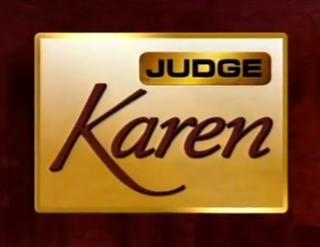
A court is any person or institution, often as a government institution, with the authority to adjudicate legal disputes between parties and carry out the administration of justice in civil, criminal, and administrative matters in accordance with the rule of law. In both common law and civil law legal systems, courts are the central means for dispute resolution, and it is generally understood that all people have an ability to bring their claims before a court. Similarly, the rights of those accused of a crime include the right to present a defense before a court.
In English civil litigation, costs are the lawyers' fees and disbursements of the parties.

Court dress comprises the style of clothes and other attire prescribed for members of courts of law. Depending on the country and jurisdiction's traditions, members of the court may wear formal robes, gowns, collars, or wigs. Within a certain country and court setting, there may be many times when the full formal dress is not used. Examples in the UK include many courts and tribunals including the Supreme Court of the United Kingdom, and sometimes trials involving children.

Judge Judy is an American arbitration-based reality court show presided over by former Manhattan Family Court Judge Judith Sheindlin. The show featured Sheindlin as she adjudicated real-life small-claims disputes within a simulated courtroom set. Prior to the proceedings, all involved parties signed arbitration contracts agreeing to Sheindlin's ruling. The show aired in first-run syndication. As it was during its active years in production, it continues to be distributed by CBS Media Ventures in syndication, now in reruns that still draw notably high ratings.

Judge Mathis is an American arbitration-based reality court show presided over by Judge Greg Mathis, a former judge of Michigan's 36th District Court and Black-interests motivational speaker/activist.

The People's Court is an American arbitration-based reality court show, featuring an arbitrator handling small claims disputes in a simulated courtroom set. Within the court show genre, it is the first of all arbitration-based reality-style programs, which has overwhelmingly become the convention of the genre. The original series ran from 1981 to 1993, and the revival ran from 1997 to 2023. Both versions have run in first-run syndication. The show ranks as the longest-running traditional court show and second-longest-running court show in general, having a total of 38 overall seasons as of the 2022–23 television year, behind only niche court show Divorce Court by 2 seasons.

A courtroom is the enclosed space in which courts of law are held in front of a judge. A number of courtrooms, which may also be known as "courts", may be housed in a courthouse. In recent years, courtrooms have been equipped with audiovisual technology to permit everyone present to clearly hear testimony and see exhibits.

Judge Joe Brown is an American arbitration-based reality court show starring former Shelby County, Tennessee criminal court judge Joseph B. Brown. The series premiered on September 14, 1998 and ran through the 2012–13 television season for a total of fifteen seasons. Joe Brown was the second highest paid daytime television personality behind Judge Judy during the time the show was running.

Circuit judges are judges in England and Wales who sit in the Crown Court, the County Court and some specialized sub-divisions of the High Court of Justice, such as the Technology and Construction Court. There are currently over 600 circuit judges throughout England and Wales.

There are various levels of judiciary in England and Wales—different types of courts have different styles of judges. They also form a strict hierarchy of importance, in line with the order of the courts in which they sit, so that judges of the Court of Appeal of England and Wales are given more weight than district judges sitting in county courts and magistrates' courts. On 1 April 2020 there were 3,174 judges in post in England and Wales. Some judges with United Kingdom-wide jurisdiction also sit in England and Wales, particularly Justices of the United Kingdom Supreme Court and members of the tribunals judiciary.
In common law, a right of audience is generally a right of a lawyer to appear and conduct proceedings in court on behalf of their client. In English law, there is a fundamental distinction between barristers, who have rights of audience in the superior court, and solicitors, who have rights of audience in the lower courts, unless a certificate of advocacy is obtained, which allows a solicitor advocate to represent clients in the superior courts also. There is no such distinction in American law.

Judge Karen is an American arbitration-based reality court show that aired in first-run syndication and ran for one season, during the 2008–09 television period. The series debuted on September 8, 2008, in 48 of the top 50 U.S. markets.
Judge Jeanine Pirro is an American arbitration-based reality court show, presided over by retired Westchester County, New York, District Attorney Jeanine Pirro. The series debuted on The CW on September 22, 2008 and ended in May 2011.
A court show is a broadcast programming genre comprising legal dramas and reality legal programming. Court shows present content mainly in the form of legal hearings between plaintiffs and defendants, presided over in one of two formats: scripted/improvised with an actor portraying a judge; or, an arbitration-based reality format with the case handled by an adjudicator who was formerly a judge or attorney.

Robert Michael Rinder, sometimes known as Judge Rinder, is a British criminal barrister and television personality. In 2014, while still a practising barrister, he began hosting the reality courtroom series Judge Rinder. In 2019, he also began hosting the Channel 4 series The Rob Rinder Verdict.
Legal Cheek is a British legal news website. It also has a careers section featuring research about law firms and barrister chambers and a large following on social media.

2 Hare Court is a barristers' chambers specialising in criminal and regulatory law, located in the Inner Temple, one of the four Inns of court. Established in the 1967, It employs 77 barristers, including 23 King's Counsel and several former prosecutors, including those who have acted as First Senior, Senior and Junior Treasury Counsel – barristers appointed by the Attorney General to prosecute the most serious and complex criminal cases to come before the courts.

Judge Romesh is a British comedy television show broadcast on Dave. It features Romesh Ranganathan settling disputes in a fictional civil court. The show is unscripted, and the claimant and defendant are generally members of the public, although some cases are between celebrities. Ranganathan is assisted by the bailiff, Tom Davis, and a clerk—Kerry Howard in series 1 and Jessica Knappett in series 2.

Judy Justice is an American arbitration-based reality court show presided over by former Manhattan Family Court Judge Judith Sheindlin. Judy Justice is both a spin-off and continuation of courtroom series Judge Judy (1996–2021). The show features Sheindlin adjudicating real-life small-claims disputes within a simulated courtroom set. Prior to the proceedings, all involved parties sign arbitration contracts agreeing to Sheindlin's ruling.

Judge Steve Harvey is an American arbitration-based reality court comedy show hosted by Steve Harvey. The series premiered on ABC on January 4, 2022. Unlike most courtroom programming which airs in the daytime television bracket, Judge Steve Harvey airs in prime time. Also in contrast to most courtroom programming, which typically airs a new episode for each weekday, Judge Steve Harvey takes the approach of a sitcom television schedule, airing one new episode per week.















